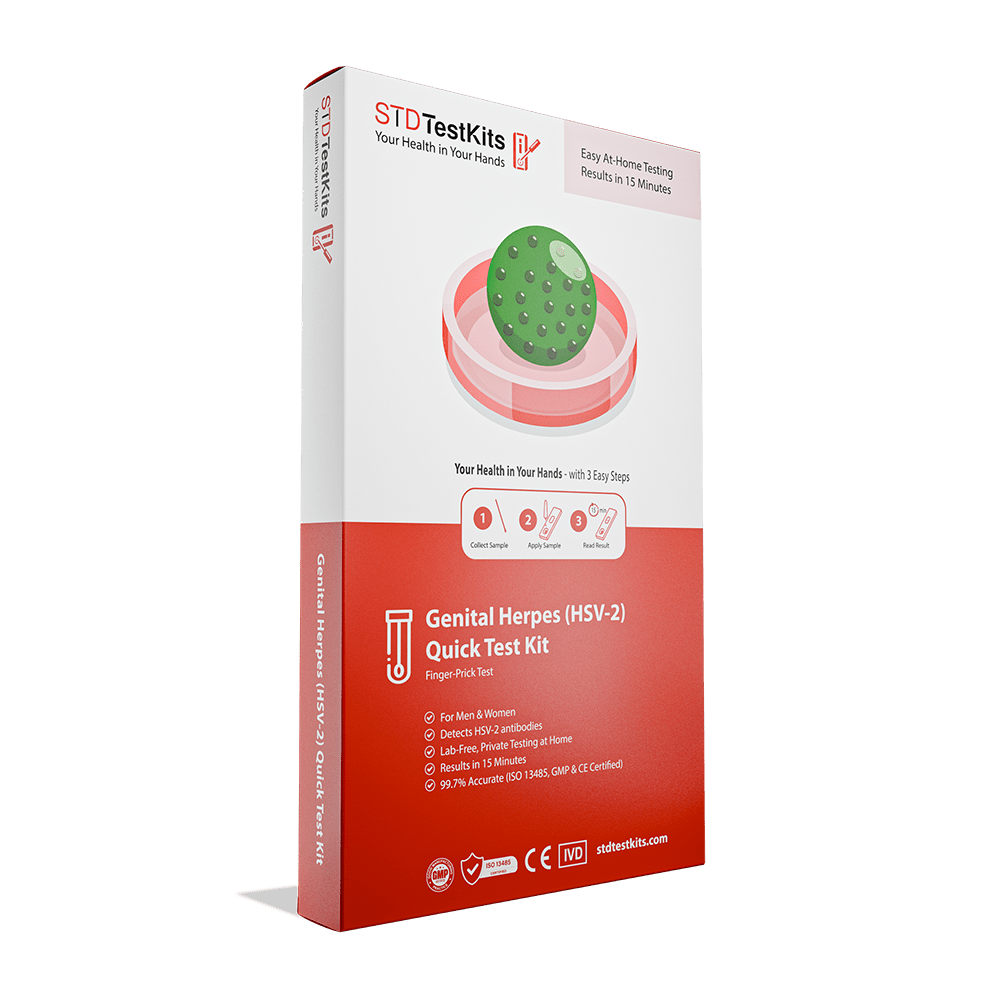No Symptoms, No Clue, Why Herpes Often Goes Undetected
Quick Answer: Yes, you can pass on oral herpes even if you’ve never had a cold sore. Asymptomatic shedding means the virus can be contagious even when you feel completely fine.
This Is What It Looked Like for Me (And What I Missed)
I thought I was safe. I’d never seen a blister, never had a split lip or red bump. When I heard “herpes,” I imagined painful sores and obvious signs. I didn’t think it could be something quiet. Something invisible. But that’s how it showed up in my body, and how it left without me knowing.
My ex had their first outbreak after we’d broken up. A small, painful sore on the inside of their lip that they thought was a canker sore, until it got worse. A test confirmed it was herpes simplex virus type 1. And when they told me, the guilt hit like a brick. I’d never been tested specifically for herpes. I didn’t even know that most standard STD panels skip it unless you ask.
It turns out, I’m not alone. A huge number of people who carry oral herpes have no idea they’re infected. The virus can quietly live in the body, usually picked up in childhood through nonsexual contact. But in adults, especially sexually active ones, the risk of unknowingly transmitting it is very real, even when you feel perfectly fine.
The Medical Reality: Asymptomatic Shedding Is Real
Here’s what most people don’t realize: herpes can be contagious even when there are no visible symptoms. This is called asymptomatic viral shedding, and it’s why so many people unknowingly pass on the virus to partners, friends, or even children through casual contact.
According to the CDC, herpes simplex virus (HSV-1 or HSV-2) can shed from the skin or mucous membranes even when you don’t feel a thing. This shedding is most common in the days leading up to or just after an outbreak, but it can also happen completely randomly, especially in people who’ve never had symptoms.
In a longitudinal study of HSV-1 carriers, researchers discovered that shedding transpired on approximately 9–18% of the days tested, even among individuals devoid of active lesions. That means almost 1 in 10 days, someone could be shedding the virus without knowing it. And during that time, something as simple as sharing a drink or kissing could spread it.
Table 1. Transmission risk of oral herpes in everyday situations, even without symptoms present.

People are also reading: The Numbers Don’t Lie Why Non-Sex Workers Often Have Higher Undiagnosed STD Rates
“But I Didn’t Have a Cold Sore”, And Why That’s Not Enough
The biggest myth around herpes is that it’s only contagious when there’s a sore. While visible blisters do carry a higher viral load, research shows that symptom-free carriers can and do spread the virus, sometimes more than once a month. This is especially dangerous in oral-genital contact, where the virus can jump zones and become genital herpes in someone else.
One of the most emotionally damaging moments in all this was realizing that I may have exposed past partners, too. People I kissed casually. Hookups where things never got “all the way.” That’s how sneaky HSV-1 is, it doesn’t need full-on sex. It just needs contact, warmth, and a chance.
I started spiraling. Had I infected multiple people? Should I contact everyone I’ve kissed? Was I a danger without knowing it? This is the mental trap of herpes: it doesn’t just affect your skin, it affects your sense of self. Of responsibility. Of safety.
But here’s what I’ve learned: guilt doesn’t prevent transmission. Education, testing, and honest conversations do.
Testing for Oral Herpes: What You Need to Know
Here’s the catch: most standard STD panels don’t test for herpes unless you specifically ask. Even then, the tests have limitations. A swab test can only detect herpes if there’s an active lesion. A blood test (called IgG) can show antibodies for HSV-1 or HSV-2, but it can’t tell where the infection is located (oral or genital), or when you got it.
If you’ve never had symptoms, your best bet is to use an at-home herpes test that screens for antibodies. These are especially helpful if you suspect exposure, or if a past partner has recently tested positive.
Table 2. Comparing herpes testing options, timing, and what each can reveal.
What Happens When You Tell Someone
It took me two days to message my ex back. Not because I didn’t care, but because I was frozen. What do you even say when you might’ve given someone herpes without knowing? How do you explain something you didn’t realize you had? Eventually, I typed: “I’m sorry. I didn’t know. I’ve never had symptoms, but I’ll get tested.”
To their credit, they were calm. Hurt, but calm. They said they weren’t blaming me. That they just wanted me to know. But it didn’t stop the guilt from soaking into everything. I replayed every kiss, every moment where I could’ve said something but didn’t. The truth was, I couldn’t have said something. I didn’t know.
But now I did. And I had to figure out what that meant for future relationships. I started reading stories, Reddit threads, medical articles, personal blogs, trying to understand what disclosure looks like when your symptoms are invisible. Turns out, it’s a question a lot of people ask themselves after getting diagnosed: “Do I tell every partner?” “What if they reject me?” “What if I scare someone for no reason?”
Shame Is the Real Virus, And It Spreads Fast
Here’s the messed-up part: herpes isn’t medically dangerous in most healthy adults. It doesn’t cause infertility. It rarely leads to severe complications. And it can be managed easily with antivirals. But the stigma? That’s a whole different beast.
The social shame around herpes is what makes people panic, hide, and ghost. It’s what makes someone feel “dirty” for having a virus that more than half the population carries. The stigma is more painful than the blisters, more isolating than the infection, and more contagious than the virus itself.
That’s why I’m writing this. Because I wish I’d known that you can have herpes and still be a good partner. A responsible person. A sexy, whole, desirable human being. I wish someone had told me that herpes doesn’t cancel your worth, it just requires a new kind of conversation.
How to Tell a Partner, Even If You Just Found Out
When I finally started dating again, I practiced the script in my head. Not because I wanted it to sound rehearsed, but because I needed to hear myself say it. The first time I disclosed, I sat on my hands to keep them from shaking. I said: “Before we go any further, I want you to know I carry HSV-1. It’s oral herpes. I’ve never had symptoms, but I could still shed the virus occasionally. I wanted you to have all the info.”
He blinked, then nodded. “Oh. I think I already have that. I got a cold sore once in college.” That was it. The world didn’t end. He didn’t run. We talked. We kissed. The moment passed.
Of course, not every reaction is that calm. Some people might need time. Others might walk away. But the goal isn’t perfect acceptance, it’s honesty. It’s giving someone the dignity of choice, just like you’d want. And if someone rejects you for something as common and manageable as oral herpes? That’s not your shame to carry.
Testing helps here. Being able to say, “I’ve tested, here’s what I know, here’s what we can do to reduce risk,” changes everything. That’s why I now keep a couple at-home herpes test kits on hand, not just for me, but for transparency when it matters.
Protecting Others Without Punishing Yourself
After I knew I had oral herpes, I changed a few habits. No kissing during chapped lips or cold weather cracks. I held off on oral sex when I felt run down or had tingling near my lip. I didn’t share drinks with friends during cold and flu season. None of this was extreme. It didn’t kill spontaneity. It just made me feel like I was protecting people I cared about.
I also started learning about antiviral meds. Valacyclovir, for example, can reduce shedding significantly. Some people take it daily; others only during outbreaks. I haven’t started meds yet because I’ve still never had a visible outbreak, but I keep the info in my back pocket in case that ever changes.
Most importantly, I stopped beating myself up. I realized that herpes doesn’t define me. The fact that I was symptomless didn’t make me reckless. It just made me human. And now that I know better, I can do better, without living in shame.
Everyday Transmission Scenarios: What Really Puts People at Risk?
After I got my test results back, I started reviewing every past interaction like I was solving a crime. Did I kiss someone at that party? Did we share a vape pen? Did I drink from someone’s bottle? It sounds dramatic, but that’s what herpes can do. It turns your memory into a minefield.
But the truth is, most transmission scenarios fall into a few very human, very normal categories. You don’t need to be reckless to pass it on. You just need to be unaware, and that’s what makes HSV-1 so insidious. It hides in kindness, in casual closeness, in moments that feel safe.
Here’s what the science actually says: most people get oral herpes from a family member or close contact during childhood. But adult transmission is rising, especially among young adults who don’t realize cold sores are herpes. One study published in the journal Sexually Transmitted Diseases found that oral HSV-1 was a major cause of genital herpes cases due to oral sex.
You don’t have to be symptomatic to pass it. You don’t even need to know you have it. But once you do, you can take steps that reduce risk without ruining intimacy.

People are also reading: What No One Tells You About Cleaning Sex Toys (and Why It Matters)
Should You Get Tested If You Have No Symptoms?
This was the hardest question I faced after my ex’s call: Should I get tested if I’ve never had a cold sore? The answer, I found, isn’t black and white. Most doctors don’t recommend routine herpes testing unless you’re symptomatic or have a partner with a known diagnosis. That’s partly because the results can be emotionally disruptive, and because false positives can happen with early or low-sensitivity antibody tests.
But if you’ve been exposed, or feel guilty about possibly exposing someone, testing can bring clarity. Just know what you’re testing for. A swab won’t help unless there’s an active sore. What you want is a blood-based antibody test, usually after 4–6 weeks post-exposure for accurate results.
If you want to test discreetly and skip the clinic wait, you can use a reliable at-home herpes rapid test kit that checks for HSV-1 and HSV-2 antibodies. These are especially useful for people who never get visible symptoms but still want to be responsible with their partners.
What If You Test Negative, But Still Worry?
Herpes testing isn’t perfect. There’s something called the “window period”, the time between infection and when a test can reliably detect it. For herpes antibody tests, this window can be anywhere from 2 to 12 weeks depending on the individual and the test sensitivity.
In my case, I tested at the six-week mark. Negative. Then again at 12 weeks, just to be sure. Still negative. That gave me peace of mind, but I also understood that negative doesn’t always mean “no risk.” It just means “not detected.”
Here’s a general breakdown of what test timing looks like:
Table 3. Antibody test reliability increases over time after HSV exposure.
If You Test Positive, What Comes Next?
First of all, breathe. A positive herpes result, especially for HSV-1, isn’t the end of your sex life. It’s not a scarlet letter. It just means you carry a virus that nearly four billion people do worldwide. Let that sink in: almost half the planet. You are not dirty. You are not broken. You are statistically average.
Depending on your symptoms, you may never need treatment. But if you do have outbreaks, a doctor can prescribe valacyclovir or acyclovir, both effective and affordable. You can take them daily or during outbreak flares. You can still kiss, cuddle, fall in love, and have amazing sex. You just need to talk, test, and time things smartly.
Disclosure gets easier the more you practice. If you lead with facts, not fear, most people will match your energy. I started saying, “I carry HSV-1 like half the world. It’s oral herpes. I haven’t had symptoms, but I like to be honest.” And honestly? It’s worked. Every time.
FAQs
1. Can I seriously pass on herpes even if I’ve never had a cold sore?
Yep. And that’s the frustrating part. You can be totally symptom-free and still shed the virus. It’s called asymptomatic shedding, and it’s the reason so many people pass herpes without ever knowing they had it in the first place.
2. So... kissing is enough?
Unfortunately, yes. Kissing, sharing drinks, or just swapping spit in any way during a shedding phase (even if you feel fine) can be enough to spread HSV-1. Most people don’t realize it, but it’s how the majority of us got it before we ever hit puberty.
3. Is it worth testing if I’ve never had a sore?
If you want clarity, for yourself or your partners, then absolutely. Especially if someone you’ve been with tests positive. Just know the test detects antibodies, not the virus itself, so timing matters. Best accuracy is after the 8-week mark.
4. Wait, so HSV-1 and HSV-2 aren’t the same?
Not quite. HSV-1 usually shows up as oral herpes (think cold sores), while HSV-2 is more often linked to genital infections. But thanks to oral sex, they can swap places. You can get HSV-1 genitally or HSV-2 orally depending on who’s doing what to whom.
5. What if I test positive but never get symptoms?
Then you’re one of the many people carrying herpes quietly. It means your immune system keeps things in check. You can still be contagious sometimes, but there’s nothing "wrong" with you. Just something to be honest about moving forward.
6. Do I have to tell partners?
Morally? Yes. Legally? Depends on where you live. But from a sex-positive, human place? Being honest builds trust. A lot of people already have HSV-1 and don’t even know it. Saying “I just found out I carry oral herpes, here’s what that means” is braver (and sexier) than hiding it.
7. What’s the medication situation?
If you’re having outbreaks, a doctor can prescribe antivirals like valacyclovir (Valtrex). Some folks take it daily to reduce shedding, even without symptoms. Others just have it on hand in case something flares up. It's affordable and effective, and doesn't mess with your sex life.
8. Is it true herpes is forever?
Technically yes, but so is being awesome. Once you have the virus, it stays in your system, but that doesn’t mean it’s active. Many people go years, decades even, without a single sore. It's manageable, not catastrophic.
9. How do I know if it’s a cold sore or just a canker sore?
Canker sores stay inside your mouth, on the tongue, cheeks, or gums, and they’re not contagious. Cold sores usually show up outside, like on the lip or mouth edge, and they tingle before they blister. If it itches, burns, or weeps fluid, it’s probably herpes knocking.
10. How common is this, really?
More common than you think. More than 3.7 billion people under 50 carry HSV-1 globally. That’s not a typo. It’s almost half the planet. If herpes were a country, it would be the biggest one on Earth. You’re not gross, you’re just human.
You Deserve Responses, Not Presumptions
If you were unaware that you had herpes, you might begin to question your physical appearance. But it doesn't have to shape your relationships, your worth, or the choices you make in the future. You are still capable of intimacy, honesty, and connection. You just have one more piece of information now, something you can use to protect yourself and others.
Don’t wait in the dark. If you suspect exposure, or just want to stop guessing, this discreet at-home herpes test kit can give you clarity in minutes. You deserve that peace of mind.
How We Sourced This Article: We combined current guidance from leading medical organizations with peer-reviewed research and lived-experience reporting to make this guide practical, compassionate, and accurate.
Sources
1. Herpes – STI Treatment Guidelines (CDC)
2. Cold sore – Symptoms and causes (Mayo Clinic)
4. Herpes Simplex Type 1 – StatPearls / NCBI Bookshelf
5. Herpes Simplex Virus (BCCDC)
6. HSV Type 1 Overview (Mayo Clinic Labs)
7. Herpes Simplex Factsheet (ND Department of Health & Human Services)
About the Author
Dr. F. David, MD is a board-certified infectious disease specialist focused on STI prevention, diagnosis, and treatment. He blends clinical precision with a no-nonsense, sex-positive approach and is committed to expanding access for readers in both urban and off-grid settings.
Reviewed by: Alexia Tran, RN, MSN | Last medically reviewed: November 2025
This article is for informational purposes and does not replace medical advice.







